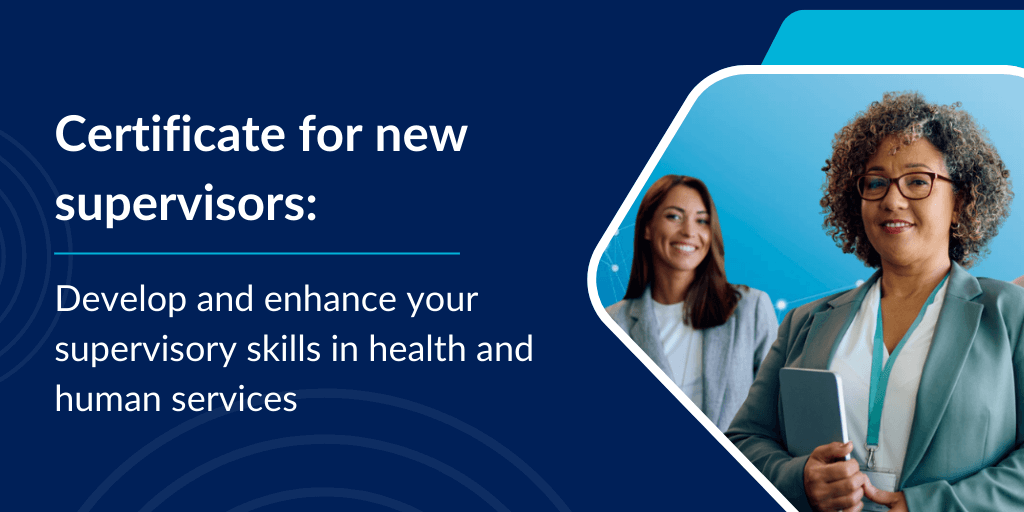Certificate for new supervisors: Supervisor training for health and human services professionals

This supervisor training provides professionals the opportunity to examine the multi-faceted role of the supervisor. Participants will be able to strengthen their leadership proficiency and develop the practical skills needed to be an effective supervisor/leader in health and human services.
This program consists of four comprehensive modules designed to equip new, aspiring and existing supervisors with essential leadership skills. Each module delves into a vital dimension of effective leadership, providing practical insights and strategies for success.
Key topics covered:
- Setting clear expectations, delegation, providing feedback, and coaching
- Tools to motivate staff, achieve peak performance, and embrace change
- Preparation techniques for conducting challenging conversations
- Gaining trust, respect, and fostering positive working relationships
This program is offered as an open module series, allowing the flexibility to register for any of the four individual modules or the entire series, depending on your learning objectives. Whether you choose to join one module or all four, this series aims to provide valuable insights and practical tools for those looking to enhance their supervisory/leadership skills.
Individual modules include:
Module 1: Essential skills for the new supervisor – Explore the basics of supervision, such as how to set clear expectations, delegate, provide feedback and coach staff members
When: February 11, 2025 | 9 a.m. to 4 p.m. ET
Facilitator(s): Susan Geary, PhD
Learning objectives:
- Explore the difference between being a supervisor, manager, and leader
- Discuss some of the challenges in making the transition to supervision
- Learn how to set goals and clarify expectations
- Be able to delegate work so that their staff not only learn and grow but also complete the task effectively
- Explore their style as a supervisor and the impact of that style on others
- Examine best practices in giving feedback and coaching employees to maximize performance
- Explore a key time management tool that can free up the time required to supervise effectively
Module 2: Leadership and motivation – Examine leadership tools that motivate staff members to achieve peak performance and embrace change
When: February 13, 2025 | 9 a.m. to 4 p.m. ET
Facilitator(s): Susan Geary, PhD
Learning objectives:
- Understand what leadership is and why it is important
- Learn how to inspire staff members by helping them see the connection between their role and the vision and values of the organization
- Identify ways to motivate people and reenergize staff
- Be able to communicate with people who have different temperaments in the workforce
- Use an easy-to-follow model of change that ensures that people are on-side and committed to change
- Build a high-performing team to increase the productivity and satisfaction of the group
Module 3: Holding difficult conversations – Understand how to prepare for and conduct any difficult conversation
When: March 4, 2024 | 9 a.m. to 4 p.m. ET
Facilitator(s): Marion Langford, M.Ed.
Learning objectives:
- Create clear expectations for the conduct of conversations of this kind
- Cultivate a practice that will build a bridge to understanding another person
- Recognize the different stress responses during difficult conversations, and strategies to address them
- Identify the clear and compelling reasons the conversation is required
- Practice how to open this type of conversation
- Identify the questions and the feedback that will improve understanding and options to resolve issues
Module 4: Cultivating your credibility and influence as a supervisor – Learn how to engage people in a way that gains their trust, respect, and creates positive working relationships
When: March 6, 2025 | 9 a.m. to 4 p.m. ET
Facilitator(s): Marion Langford, M.Ed.
Learning objectives:
- Identify the key practices and skills to effectively building trust and influence
- Lead meetings and projects in such a way that there is real engagement and commitment to outcomes
- Get clear about how values and needs are addressed in decisions
- Understand how to communicate all decisions effectively (including the ones you didn’t make, but are yours to implement)
- Recognize the necessity and the how-to of apologies for repairing relationships (and how doing so demonstrates your commitment to being accountable, and having integrity)
Please note: This is a four-module certificate program. You must complete all four modules within a year to obtain the certificate. Each of the modules may be taken on their own as a stand-alone training.



